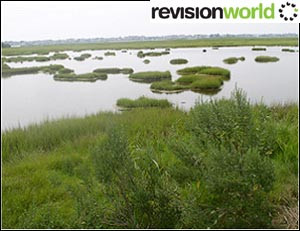Salt Marshes
In quiet coastal environments such as behind coastal spits, in estuaries, etc. sedimentation will be an active process and lead to the formation of salt-marsh.
As alluvium is deposited, salt-tolerant plants such as Salicornia begin to colonise the muddy patches which show at low tide.
The plants slow the water currents leading to increased deposition until the salt marsh begins to be covered only by the highest spring tides.
Plants such as Spartina begin to dominate the vegetation cover.
Seawater may be trapped in hollows that are not colonised by plants and as water evaporates, it leaves behind a strong concentration of salt which reduces the chances of plants colonising.
Eventually these saltpans become a semi-permanent feature of the salt-marsh.
Water drains from the salt marsh along distinctive creeks.

